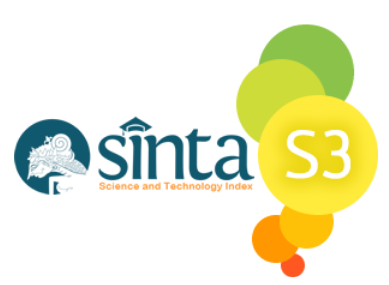A DESCRIPTIVE ANALYSIS OF TEACHER’S QUESTIONING STRATEGIES IN IMPROVING ENGLISH CLASSROOM INTERACTION FOR JUNIOR HIGH SCHOOL STUDENTS
Abstract
Questioning is the key means by which teachers find out what pupils already know, identify gaps in knowledge and understanding and scaffold the development of their understanding to enable them to close the gap between what they currently know and the learning goals. Questioning Strategy is also used to motivate students in a learning process. During the teaching process, teachers of SMPN 3 Rejoso Junior High Scholl applied the questioning strategy to improve students’ comprehension. Considering that reason, this research was intended to know what is the questioning strategy applied by teachers in learning English. This study was conducted using qualitative research design. The instrument used was interview. The respondents of this research were three English teachers and ten students from second and third grade in various level of proficiency in English lesson. The result of this study shows that the applications of questioning strategy gave positive Impacts for teachers and students. English teachers agreed that questioning strategy is useful to help students active in learning process and also build the students’ motivation in learning English. The main obstacle faced is language barrier and students’ lack of awareness to study English. Almost all students agreed that the questioning strategy had a good effect. The students found the teacher’s strategy very interesting and effective to build their motivation.
Keywords
Full Text:
PDFReferences
Albelgaria Almaida, P. (2010). Questioning Pattern and Teaching Strategies in Secondary Education. International journal of learning. 17 (1).
Brophy (2010). Motivating students to learn. Boston, MA: McGraw Hill
Brown, H. D. (2001). Teaching by Principle: an interactive approach to language Pedagogic. Longman publisher.
Cadzen, C. B. (2001). Classroom Discourse: The language of Teaching and Learning. Portsmoutt:
Heneiman.
Coates, Paul. (2007). The Metaphysics of Perception. New York: Routledge.
Elis, R. (1992b). Learning to communicate in the classroom. Studies in Second Language Acquisition, 14, 1-23.
Gattis, K. (2002) in Sujariati and Mahmud (2016). A look at productive tutoring Techniques user’s guide. 2 nd. Ed. Raleigh: North Carolina State University.
Guest, (1985,P.2). The case study method: Critical thinking enhanced by effective teacher questioning skills. The 18th Annual International Conference of the World Association for Case MethodResearch & Application
Harvey, Stephanie. (2000). A literacy consultant and staff developer for the Denver-based Public Education and Business Coalition. She coauthored, with Anne Goudvis, Strategies That Work: Teaching Comprehension to Enhance Understanding
Hohwy, J. (2013). The Predictive Mind. Oxford: Oxford University Press.
Hunkin, F. (1976). Involving students in questioning. Boston: Allyn and Bacon.
Jacobsen, D. A. Et al. (1999). Methods for teaching (5th ed.). New Jersey: Prentice Hall.
Jamie McKenzie (2005) Learning to Question to Wonder to Learn.
James H. McMillan (2008) Fundamentals of Educational Research. jmcmillan@vcu.edu.
Jessica Fries-Gaither (2008) Questioning Techniques: Research-Based StrategiesTeacers.Retrievedon4February,2009.http://thesecondprinciple.com/teaching -essentials/five-basic-types-questions.
Kerry, T. (2002). Explaine and Questioning. London: Nelson Thomes.
Lynch, T (1991). Questioning Roles in the classroom. ELT Journal. 45 (3).
Mackey, A., & Gass, S. M. (2005). Second language research: Methodology and design.
Mehan, H. (1979). Learning lesson. Cambridge: Harvard University press.
P. E. Blosser. (1975). How to Ask the Right Questions. National Science Teachers Association.
Sarkol, K. (2016). Student Perception of Learning English in Senior High School of Kaimana, West Papua. English Language Studies. Sanata Dharma University, Yogyakarta.
Schreiber, J. B (1967). Teachers question-asking technique in social studies. Unpublish Ph.D.
Thesis, University of Iowa.
S.Jamshed (2014) Qualitative research method-interviewing and observation.
Smith, R.C. (2000) Starting with ourselves: Teacher-learner autonomy in language learning. In B. Sinclair, I. McGrath and T.
Sujariati, Rahman, Q & Mahmud M. (2016). English Teacher’s Questioning Strategies in EFL Classroom at SMAN 1 Bontomarannu. ELT Worlwide. 3(1): 107-121.
Yang, H. (2017). A Research on the Effective Questioning Strategies in Class. Science Journal of Education. 5(4): 158-163.
Zigman, P. (2018). Theories of Perception and Recent Empirical Work. CUNY academic work.
DOI: https://doi.org/10.18551/erudio.8-2.8
Refbacks
- There are currently no refbacks.
Copyright (c) 2022 Erudio Journal of Educational Innovation

This work is licensed under a Creative Commons Attribution 4.0 International License.












